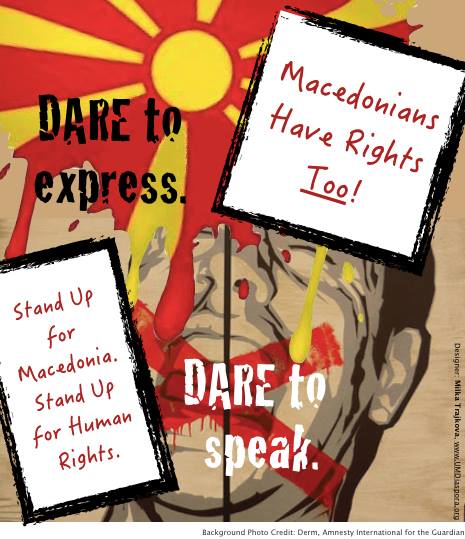 Today, the United Macedonian Diaspora (UMD), and the global community working to preserve, promote, and ensure equal human rights for all, marks the 66th anniversary of the Universal Declaration of Human Rights (UDHR), or International Human Rights Day. UMD encourages all Macedonians to use this opportunity to reflect on the challenges and the strides in the global human rights struggle for Macedonia and Macedonians.
Today, the United Macedonian Diaspora (UMD), and the global community working to preserve, promote, and ensure equal human rights for all, marks the 66th anniversary of the Universal Declaration of Human Rights (UDHR), or International Human Rights Day. UMD encourages all Macedonians to use this opportunity to reflect on the challenges and the strides in the global human rights struggle for Macedonia and Macedonians.
UMD wishes to commend all Macedonian human rights groups in Albania, Australia, Bulgaria, Canada, Greece, Kosovo, Serbia, and the United States for their decades-long service to ensure equal rights for Macedonians in less privileged societies. But our work is not done. Together, united, we can.
Nelson Mandela once said, “When people are determined they can overcome anything.”
“Macedonians were determined 111 years ago in our liberation from the Ottoman Empire, 70 years ago during the anti-fascist movement, and 23 years ago when we achieved a free, independent, and sovereign Macedonia,” said UMD Chairman Stojan Nikolov.
The challenges we face are many:
- Although, Macedonia is a member of the United Nations Human Rights Council, the country is still known as “the former Yugoslav Republic of Macedonia” at the United Nations, NATO, and the European Union, among other international institutions.
- Macedonia’s leaders face internal and foreign pressure to not withdraw from the UN-led negotiations.
- Australia, France, Germany have yet to recognize Macedonia’s legitimate name.
- Google Maps labels the country as “Macedonia (FYROM).”
- NATO and EU membership is not in close sight for Macedonia, due to Greece’s blocking. NATO and EU succumb to Greek pressure time and time again.
- 66 years after the UDHR, Macedonians living in Bulgaria, and Greece, are denied the most basic human rights of self-determination, assembly, speech, religious freedom, and the press.
- Macedonians in Albania, Kosovo, and Serbia enjoy some basic human rights but still much more to do.
Nikolov added “The determination set forth by our parents, grandparents, and ancestors must be carried on by our generation and future generations of younger Macedonians if we are going to overcome the challenges we as a Macedonian Diaspora-at-large face daily.”
10 years ago, UMD was founded with a clear commitment to safeguarding the human rights for Macedonians globally as a core principle of its mission. In 2005, UMD initiated a petition signed by over 100,000 individuals to bring an end to racial, ethnic and religious discrimination against ethnic Macedonians. Since then, UMD has worked tirelessly on this issue year after year. In 2015, UMD plans several initiatives to educate the public on human rights problems facing Macedonians.
On this historic day, UMD invites all Macedonians to continue to work together and to spread the truth about Macedonia and Macedonians. UMD will continue to work to ensure that human rights are upheld and respected, and encourages all Macedonians to get involved in our important work. It is crucial that Macedonians have a diplomatic, persistent, professional, strong, and united voice before global policymakers.
Become a member of UMD or renew your membership today by clicking here.


